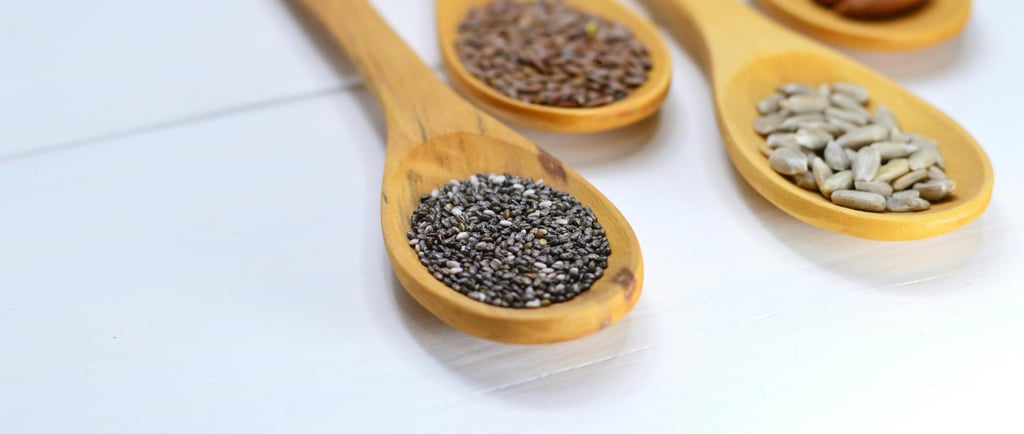5 Seeds to Eat in Winter for Boosting Health and Immunity
Discover the top 5 seeds to eat in winter to boost your immune system, improve digestion, and keep your energy levels high. Learn how to incorporate these nutrient-rich seeds into your winter diet.
DIET AND NUTRITION
12/17/20243 min read
As the winter months settle in, it's important to support your body with nutrient-rich foods that keep you energized, healthy, and strong. Seeds are a great way to fuel your body with essential vitamins, minerals, and healthy fats during the colder season. Packed with antioxidants, fiber, and essential fatty acids, certain seeds can offer a boost to your immune system, improve digestion, and help maintain overall wellness.
In this blog post, we’ll explore five seeds that are perfect for winter, providing you with the nutrients you need to stay strong and vibrant throughout the season.
1. Chia Seeds: A Powerhouse for Immunity and Digestion
Chia seeds are one of the best seeds to eat in winter due to their high fiber content, which aids in digestion and keeps you feeling full longer. With winter often leading to reduced physical activity and overeating, chia seeds are an excellent way to manage hunger and improve gut health. These tiny seeds are also rich in omega-3 fatty acids, which support heart health and reduce inflammation – a common issue during the colder months.
Additionally, chia seeds are packed with antioxidants, which help protect the body from harmful free radicals and support immune health during flu season.
2. Flax Seeds: Promote Healthy Digestion and Skin
Flax seeds are another excellent choice for winter, offering a range of health benefits. Rich in omega-3 fatty acids and lignans, flax seeds are known for their anti-inflammatory properties, which can help reduce joint pain and stiffness common in winter. These seeds are also high in fiber, which promotes healthy digestion and regular bowel movements—essential for maintaining a healthy gut during the winter months.
Flax seeds are also packed with antioxidants that can help nourish your skin, keeping it glowing and hydrated despite the harsh winter weather. You can sprinkle flax seeds on oatmeal, yogurt, or blend them into smoothies for an extra boost of nutrition.
3. Pumpkin Seeds: A Boost for Energy and Immunity
Packed with magnesium, zinc, and healthy fats, pumpkin seeds are one of the best seeds to eat in winter for boosting energy levels and strengthening the immune system. Magnesium helps support muscle function and relaxation, which can be particularly beneficial during the colder months when we tend to huddle indoors and may not get as much physical activity.
Zinc, on the other hand, plays a crucial role in immune health and can help keep your body resilient against winter colds. Pumpkin seeds are also rich in tryptophan, which aids in producing serotonin, the "feel-good" hormone, helping improve mood during the shorter, darker days of winter.
4. Sunflower Seeds: Promote Heart Health and Vitality
Sunflower seeds are a great source of vitamin E, magnesium, and healthy fats, making them one of the top seeds to include in your winter diet. Vitamin E is a powerful antioxidant that helps protect the body from oxidative stress, which can be heightened in the colder months. This nutrient also supports skin health and can help prevent dryness and irritation caused by winter weather.
Rich in magnesium, sunflower seeds support muscle function, enhance sleep quality, and help regulate blood pressure, which can fluctuate during winter. Eating sunflower seeds regularly can promote overall vitality and help you stay energized throughout the day.
5. Sesame Seeds: Essential for Bone Health and Hormonal Balance
Sesame seeds are packed with calcium, making them an excellent choice for supporting bone health during winter when we may be less likely to spend time outdoors in the sun, reducing our vitamin D intake. These tiny seeds also contain zinc, which helps maintain hormonal balance and supports immune function. Zinc is particularly beneficial during the winter months when colds and flu are more common.
Incorporating sesame seeds into your diet is easy—simply sprinkle them over salads, mix them into smoothies, or enjoy them as a topping on baked goods.
Eating nutrient-dense seeds in winter can help maintain energy levels, boost your immunity, and support overall health during the colder months. Chia, flax, pumpkin, sunflower, and sesame seeds are packed with essential nutrients that can promote digestion, support skin health, and strengthen your immune system. By adding these seeds to your daily diet, you can ensure that your body stays well-nourished and resilient, no matter what the winter weather brings.
So, the next time you're looking for a healthy snack or a nutritious ingredient to add to your meals, reach for these super seeds and enjoy their numerous health benefits!
The Prime Chronicle © 2024
Stay Inspired
Get fresh wellness tips straight to your inbox
We care about your data in our privacy policy.


